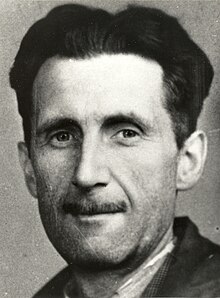Our website is made possible by displaying online advertisements to our visitors.
Please consider supporting us by disabling your ad blocker.
George Orwell
George Orwell | |
|---|---|
 Press card portrait, 1943 | |
| Born | Eric Arthur Blair 25 June 1903 |
| Died | 21 January 1950 (aged 46) London, England |
| Resting place | All Saints' Church, Sutton Courtenay, Oxfordshire, England |
| Education | Eton College |
| Occupations |
|
| Political party | Independent Labour (from 1938) |
| Spouses | |
| Children | Richard Blair (adopted) |
| Writing career | |
| Pen name | George Orwell |
| Language | English |
| Genre | |
| Subjects | |
| Years active | 1928–1949[1] |
| Notable works |
|
| Signature | |
 | |
Eric Arthur Blair (25 June 1903 – 21 January 1950) was an English novelist, poet, essayist, journalist and critic who wrote under the pen name of George Orwell. His work is characterised by lucid prose, social criticism, opposition to all totalitarianism (i.e. to both left-wing authoritarian communism and to right-wing fascism) and support of democratic socialism.[2][3]
Orwell is best known for his allegorical novella Animal Farm (1945) and the dystopian novel Nineteen Eighty-Four (1949), although his works also encompass literary criticism, poetry, fiction and polemical journalism. His non-fiction works, including The Road to Wigan Pier (1937), documenting his experience of working-class life in the industrial north of England, and Homage to Catalonia (1938), an account of his experiences soldiering for the Republican faction of the Spanish Civil War (1936–1939), are as critically respected as his essays on politics, literature, language and culture.
Orwell's work remains influential in popular culture and in political culture, and the adjective "Orwellian"—describing totalitarian and authoritarian social practices—is part of the English language, like many of his neologisms, such as "Big Brother", "Thought Police", "Room 101", "Newspeak", "memory hole", "doublethink" and "thoughtcrime".[4][5] In 2008, The Times named Orwell the second-greatest British writer since 1945.[6]
- ^ Jeffries, Stuart (24 January 2013). "What would George Orwell have made of the world in 2013?". The Guardian. Retrieved 3 March 2024.
- ^ Gale, Steven H. (1996). Encyclopedia of British Humorists: Geoffrey Chaucer to John Cleese, Volume 1. Taylor & Francis. p. 823.
- ^ Cite error: The named reference
thinktankwas invoked but never defined (see the help page). - ^ Robert McCrum, The Observer, 10 May 2009
- ^ "Quotations: G. Orwell". Oxford English Dictionary. Retrieved 2 September 2017.
- ^ "The 50 greatest British writers since 1945". The Times. 5 January 2008. Retrieved 7 January 2014.
Previous Page Next Page


